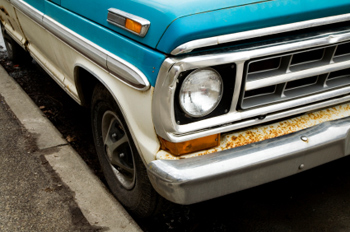There’s an old joke I’ve told many times at prayer breakfasts in the basements of small-town and rural churches among men with sunburned faces.
Seems this Midwestern farmer was driving his few dairy cows across the road when a big Cadillac with long steer horns across the front bumper roared up and stopped in the road.
Behind the wheel was a fellow in a big cowboy hat. He watched the farmer with the cows and asked him, “This your farm?”
“Yep.”
“How big a place you have here?”
The farmer motioned. “My property line runs from that line of trees you see over yonder to that ridgeline you see over there.”
“Yeah, I have me a place down in Texas,” the fellow in the big hat said. “I go out in the morning at sunup and get in my pickup and drive all day, and by the time the sun goes down, I still haven’t reached my property line.”
“Yep, I used to have a pickup like that,” the farmer said.
Well, I have a pickup like that now. It’s a 1977 Ford F-100 I inherited from my grandfather by way of my uncle and then my brother, who brought it to me the summer before last.
When my brother and I opened the cab door the first time, I quickly noticed the faint aroma of snuff that my grandfather dipped for nearly 70 years. The flashlight he always kept under the dashboard was in its place, and bolted over the back window was the same old gun rack he removed from and reinstalled in the various pickups he owned, more to hang hats and caps from than guns. Many of my earliest memories are of being in one pickup or another with him; he drove nothing else.
This one was his last. Old enough to be ugly but not old enough to be a classic, it has no frills, no air conditioner, no power steering, and a three-speed standard transmission that shifts on the steering column. It is not a comfortable pickup; it’s a pickup for work.
In the bed is my grandfather’s big toolbox. When I opened it, I discovered many of his tools, not only for his work as the all-purpose maintenance man at our local hospital for 44 years, but also for working on the truck: a roll of duct tape, a hydraulic jack, a four-way lug wrench, extra bottles of motor oil, an extra radiator hose, an extra fan belt, jumper cables, various wrenches, screwdrivers and a socket set. Here are the essentials for a man who knew how to work on his own truck.
There’s an old truism among drivers of old pickups that goes something like this: You either drive a truck with everything working or you have a broke-down truck that needs work.
Wrong. Old trucks are driven and need working on at the same time. They are always in need of more work, but you get them going and are prepared for a breakdown wherever you go.
This is exactly why I’ve named my truck Habakkuk, for verse 2:3, which says, “If it seems slow, wait for it. It will surely come.” And it is also why I’m learning patience by driving it. I’m learning that it takes a while to get somewhere, both because the truck is slow and because there is the likely chance that I’ll need to pull over and open the hood and work on it somewhere along the way.
I’m no mechanic, but I’m learning. And that’s why I have my friendly shade-tree garage on speed-dial and know the tow truck driver by his first name. Sometimes I can do the work myself, but most of the time it is beyond me and I need help. But as much as I love this truck, I get tired of working on it all the time. I get impatient that it takes longer than I expect to get someplace and that I need to be open to disruptions and breakdowns.
I’m no mechanic, but I am a pastor. And at this time of year, I see much more in this truck than a cantankerous old vehicle and memories of the grandfather I loved. I wonder, is my pickup preparing me for Advent?
This will be my 24th Advent with my present congregation. Twenty-four years of preaching these same Advent themes of waiting and preparing and patient endurance. After 24 years, I get tired of these same old texts and wonder what I’m going to say this time.
And after all these years, I wonder why my congregation still struggles with the same old things. After all, if I preach something, shouldn’t they go out and practice it? After 24 years, shouldn’t they be further down the road than they are?
O Lord, how long?
But I’m learning. Congregations always need work. And congregations never get to the place where they are “fixed” and running smoothly -- at least none that I know. There’s always something.
If it seems slow, wait for it. It will surely come.
The old teaching of the church is that if we pray for patience, God doesn’t answer our prayer by miraculously turning us into patient people. Instead, God sends us opportunities to practice patience.
So God made me a pastor. And my grandfather left me an old pickup.









